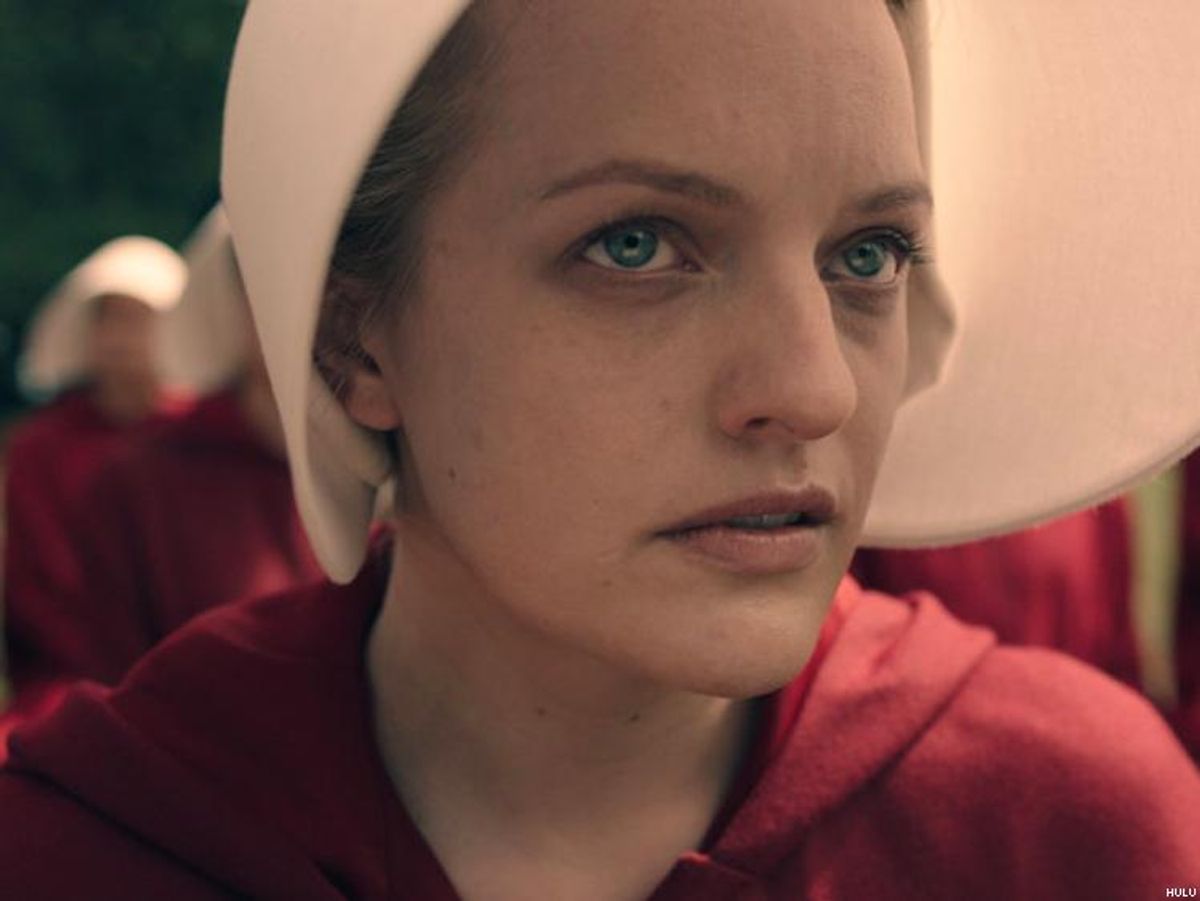By most accounts, The Handmaid's Tale, published in 1985, is a cautionary feminist story that is so of the moment under the Trump administration that it's being reissued in hardcover. But members of the cast of Hulu's adaptation of the novel into a series (premiering Wednesdat), including its star. Elisabeth Moss, bizarrely pushed against interpreting the novel as feminist at a panel at the Tribeca Film Festival over the weekend.
Margaret Atwood's prescient dystopian novel about a conservative revolution that results in a totalitarian government in which certain women are prized merely for the viability of their reproductive organs after environmental destruction renders much of the population sterile is about as feminist as it gets, and yet Moss watered down its inherent activism by suggesting that its tale is more universal, as if a feminist novel can't have universal implications.
Moss, who plays The Handmaid Tale's lead character, Offred (meaning of-"Fred," the commander whose child she is assigned to bear), told Time she identifies as a feminist. But she eschewed the term when discussing the Hulu series, something that fans of the novel like MTV's Rachel Handler found so disconcerting that she sent out a flurry of tweets that kickstarted a discussion about the novel as feminist.
"It's not a feminist story, it's a human story because women's rights are human rights. I never intended to play Peggy [from Mad Men] as a feminist and I never expected to play Offred as a feminist," Moss said at the Tribeca panel.
But it wasn't the first time Moss had invoked Hillary Clinton's famous line that she gave at the United Nations Fourth World Congress on Women in Beijing in 1995, which branded her a feminist and was recently co-opted by the organizers of the Women's March in January as its slogan for the decidedly feminist event. Moss also paraphrased Clinton in the interview she and Atwood gave to Time.
In that interview, Moss said, "The Handmaid's Tale is considered one of the great feminist novels. I actually consider it a human novel about human rights, not just women's rights," and Atwood concurred.
"Well, women's rights are human rights unless you have decided that women aren't human. So those are your choices," Atwood said. "If women are human, then women's rights are part of human rights."
Atwood elaborated on her hesitation against labeling the novel as purely feminist in the interview with Time.
"If it were only a feminist book, you would think, in that case, all the women are over here on the low side, and all the men are over here on the high side," Atwood said. "But it's more like the way human societies actually arrange themselves, which means some powerful people at the top. The women connected to those people have more power than the men connected to the bottom rank."
Although it appeared from Atwood's interview with Time that she too had dialed down the use of the f word in regard to her novel, she tweeted a caveat to Moss's Tribeca comments and to those of cast member Madeline Brewer (best known as Tricia on Orange Is the New Black's first season). Brewer, who plays the handmaid Janine, went as far as to proclaim that the series was not "feminist propaganda," invoking a term more likely to be tossed around on a Fox News show and not from a cast member of a piece of work that holds deep meaning for women.
"I think that any story, if it is a story being told by a strong, powerful woman ... any story that's just a powerful woman owning herself in any way is automatically deemed 'feminist,'" Brewer said, according to Bust. "But it's just a story about a woman. I don't think that this is any sort of feminist propaganda. I think that it's a story about women and about humans. This story affects all people."
When a follower on Twitter asked Atwood what her thoughts were on the kerfluffle over feminism, she replied that Moss and Brewer weren't necessarily wrong in their summation of the novel but that there should have been caveats. "They needed an 'only,' an 'also,' and a human rights definition of the F word, imho," Atwood tweeted, meaning "It's not only a feminist story, it's also a human story," according to The Huffington Post.
Atwood went on to clarify that the cast members were attempting to be inclusive and that they're very on board with feminism before ending on a humorous note.
"If there is any more fuss, Samira Wiley [who plays Offred's lesbian best friend, Moira] will straighten it out. Just wait till you see her carving 'Aunt Lydia Sux' on the washroom wall," Atwood wrote.



















































































Viral post saying Republicans 'have two daddies now' has MAGA hot and bothered